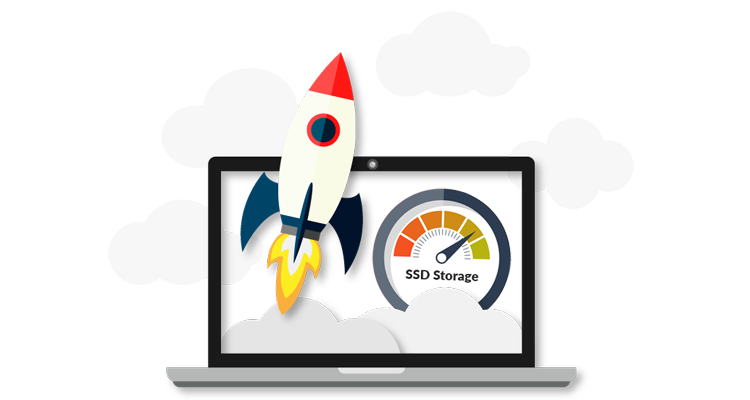The way data is stored in web hosting has changed dramatically. Hard Disk Drives and Solid State Drives are the two types of storage devices utilised in web hosting. Hard Disk Drives (HDD) have traditionally been the chosen mode of storage for web hosting companies. Web hosting firms, on the other hand, are offering robust and powerful Solid State Drives to website owners hoping to boost their website speed and performance (SSD).
All hosting kinds, including SSD VPS, SSD Cloud, and SSD Dedicated Servers, offer SSD-based web hosting options.
In this article, we’ll look at how SSD storage can help your VPS Server run faster.

SSD for VPS Servers
If you’ve lately searched for a hosting package, you’ve probably likely came across SSD VPS Hosting. It’s getting increasingly popular, and almost every major hosting company now offers an SSD VPS (Virtual Private Server) hosting plan. This means that instead of traditional Hard Disk Drives (HDDs), your VPS Server’s data is stored on Solid State Drives (SSDs).
Switching to current SSD storage has a number of advantages for your website.
1. Speed
SSDs are differentiated from HDDs by their speed. It is, without a doubt, the most beneficial characteristic of SSD VPS Hosting. The arm of an HDD reads and writes data from a rotating disc. It takes a long time to retrieve information using this strategy. However, there are no moving parts in SSDs. As a result, data is obtained virtually instantaneously. This means that with SSD storage, your website will load noticeably faster.
2. Durability
Hard disc drives (HDDs) fail from time to time. They have a lot of moving parts, which is why. There’s a lot of movement inside an HDD, between the discs and the arm. There is wear and tear whenever there is movement. And failure is a foregone conclusion in the event of extended wear and tear.
If you’ve spent enough time in the hosting industry, you’re well aware that hard disc drives fail frequently. To alleviate the difficulty, hosting firms provide excellent data backup services and will assist you in recovering your data. However, your website may be unavailable during this time. And this is a major issue for any website.
There are almost no moving parts in SSDs. As a result of the lack of wear and tear, they don’t fail as frequently. Now, this isn’t to say that SSDs don’t fail, but they do survive a long time. Yes, you’ll need backups in case something goes wrong, but you won’t need them very often. Furthermore, SSDs are far more resistant to physical harm than HDDs.
3. Price
Over the last few years, the price of SSDs has steadily decreased. SSDs were once easily four times more expensive per GB of storage than HDDs. However, this is fast changing. The decision to migrate to SSD becomes more practical when the price drops.
SSDs, on the other hand, are still not at the same pricing as HDDs. The benefits, on the other hand, surpass the cost. Durability, performance, speed, and reliability are all improved. This means that, despite the higher initial cost, SSDs are the most cost-effective option in the long run.
Conclusion
SSDs are the storage technology of the future. It’s how, in a few years, we’ll be storing pretty much everything. Laptops that run solely on SSDs are already available. HDDs just cannot compete with SSDs in terms of performance, reliability and longevity.

